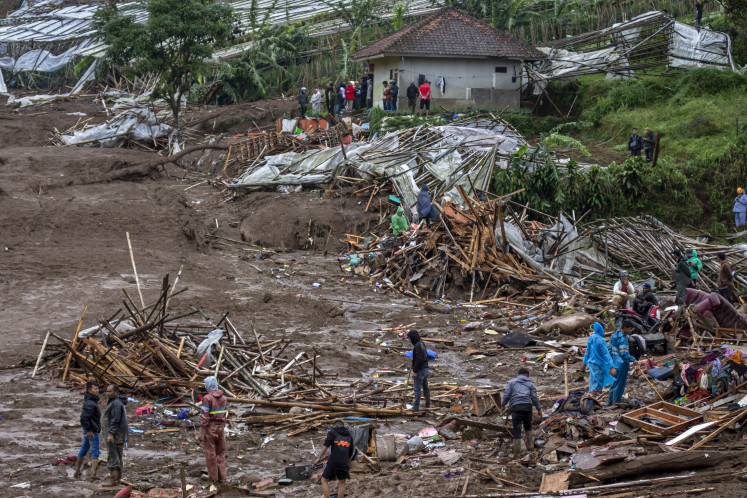Popular Reads
Top Results
Can't find what you're looking for?
View all search resultsPopular Reads
Top Results
Can't find what you're looking for?
View all search resultsRI, US firms sign deal to produce medical isotopes
State-owned companies PT Industri Nuklir Indonesia (INUKI) and IPTN North America, Inc
Change text size
Gift Premium Articles
to Anyone
S
tate-owned companies PT Industri Nuklir Indonesia (INUKI) and IPTN North America, Inc. ' a subsidiary of Indonesian aircraft firm PT Dirgantara Indonesia ' have recently signed a memorandum of understanding (MoU) with American SHINE Medical Technologies to produce medical isotopes.
State-Owned Enterprises Minister Dahlan Iskan, who attended the signing ceremony at the Indonesian embassy in Washington on Monday, said that the agreement sought to anticipate the shortage of medical isotopes due to the shut down of nuclear facilities in Canada and Europe.
'The US has become increasingly concerned about how it can supply medical isotopes to its hospitals in the future because Canada will cease operations of its nuclear reactors by 2016,' he told The Jakarta Post on Wednesday evening, adding that the majority of the isotopes used in the US were imported from Canada.
He said that while details of the partnership would be discussed at a later date, he estimated the total investment in Indonesia would surpass Rp 1 trillion (US$83.57 million).
According to the MoU, INUKI, IPTN North America and SHINE would raise funds to build medical isotope factories in Janesville, Wisconsin and in Indonesia.
The medical isotopes produced by the factories are set to be sold in the US and Asia-Pacific markets.
Dahlan said that Indonesia had so far exported medical isotopes to Malaysia, Singapore and Bangladesh.
Canada recently shut down its nuclear power plant in Québec, leaving the country with five nuclear power plants and 22 nuclear power reactors, according to information posted on the Canadian Nuclear Safety Commission (CNSC) website.
There has been growing concern among Canadians living nuclear power reactors about safety, especially after a study by the Maurice and Central Quebec public health authority found an increase in tumors in people under 20 year olds living 13 kilometers away from a nuclear reactor, Canadian Broadcasting Corporation (CBC) reported.
Nuclear reactors are commonly utilized to generate electricity and produce neutrons. The neutrons can be later converted into isotopes for medical use.
Dahlan said that SHINE, however, had found a way to produce isotopes without using nuclear reactors, an innovation previously predicted to occur in 2050.
'Indonesia had previously planned to build a new nuclear reactor to replace the aging one in Serpong, Banten, to produce more medical isotopes. However, knowing that SHINE can do it without a nuclear reactor, we canceled the plan and signed this deal instead,' Dahlan said.
SHINE CEO Gregory Piefer said that US-based factories would be able to supply two-thirds of the US' isotope demand, while Indonesian factories would serve the Asia-Pacific market.
'We are very excited to collaborate with Indonesia for two reasons. The first is because of the country's strong technical background in the production of medical isotopes, and the second is its deep knowledge of the nuclear field,' he said, as quoted by Voice of America.










